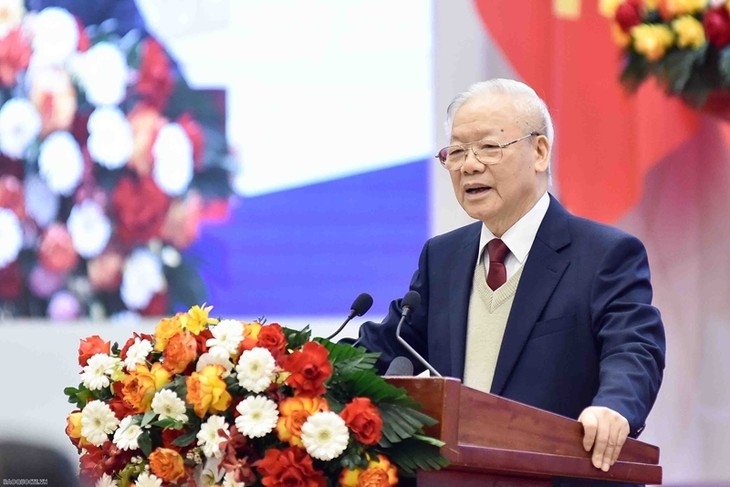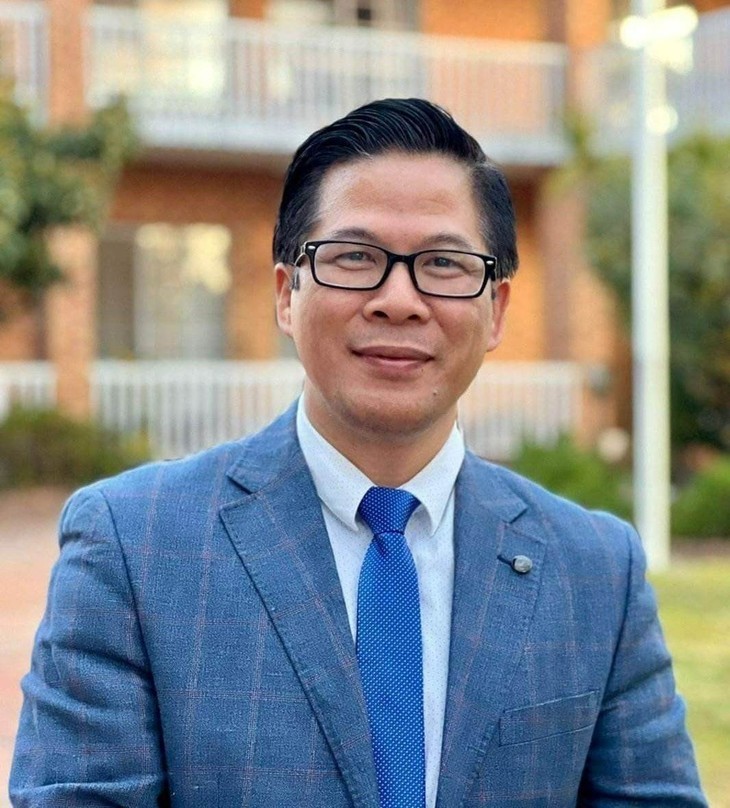 Party General Secretary Nguyen Phu Trong speaks at the 32nd National Foreign Relations Conference in Hanoi on December 19, 2023. (Photo: dangcongsan.vn) Party General Secretary Nguyen Phu Trong speaks at the 32nd National Foreign Relations Conference in Hanoi on December 19, 2023. (Photo: dangcongsan.vn) |
Marxism and others such as feminism and developmentalism are also employed but not in the mainstream. In this context, a question arises for scholars and researchers of international relations theory: does the non-Western world, or Asia, including the East Asian region, possess any theory on international relations? What is that theory? What is the basis for forming that theory?
Vietnam's foreign policy guidelines, principles, and implementation have greatly contributed to the achievements in the country's development and modernization from the 6th National Congress in 1986 up until now. Notably, since the second decade of the 21st century, under the direct leadership and guidance of the Politburo, the Secretariat, and the Central Committee, headed by General Secretary Nguyen Phu Trong, Vietnam's external work and diplomacy have contributed to creating a Vietnam that 'has never before had such stature, potential, position, and international prestige as it does today'.
This is an assertion, though 'modest' but one which 'still can be proud of', clearly stated in the 13th Party Congress Document of 2021. And these achievements in foreign affairs and diplomacy have highlighted a unique diplomatic school with a very distinct Vietnamese identity. That is the school of 'Vietnam’s Bamboo Diplomacy', and the person who introduced this concept is none other than General Secretary Nguyen Phu Trong.
So, is 'Vietnam’s Bamboo Diplomacy' a practice method or a diplomatic model? Is it a philosophy or merely a theoretical argument explaining diplomatic methods? More significantly, can 'Vietnam’s Bamboo Diplomacy' be considered a theory in international relations? If it is a theory, what are the components of this doctrine and to what extent does it carry influence, and furthermore, is it the theoretical basis for application in the daily practice of Vietnamese diplomacy and, more broadly, a lesson for other small countries such as Vietnam in international relations?
In the most general sense, a theory can be viewed in three forms: normative theory; general theory of politics; and a set of assumptions that form the basis for action. Another way to understand theory is that it is a 'tool', a 'critique', and an 'everyday practice'. Considering this meaning and Vietnam’s external work as well as diplomatic activities in recent times, we can fully assert that 'Vietnam’s Bamboo Diplomacy' carries all the above characteristics of a theory, and therefore 'Vietnam’s Bamboo Diplomacy' is a unique Vietnamese-invented theory of international relations. The person who developed it and elevated it to a theory, rather than it being merely a concept in international relations, is, again, General Secretary Nguyen Phu Trong.
At the 29th Diplomatic Conference on August 22, 2016, General Secretary Nguyen Phu Trong first used the phrase 'Vietnamese Bamboo' to describe the Vietnamese school of diplomacy. General Secretary Nguyen Phu Trong summarized: "For over 70 years, under the leadership of the Party and President Ho Chi Minh, our foreign affairs activities have achieved many glorious accomplishments, building a unique diplomatic school that is both compassionate and resilient, knowing when to be flexible and when to be firm, understanding the times and circumstances, knowing oneself and others,... reflecting the spirit and character of the Vietnamese people."
Subsequently, at the National Conference on External Work to implement the Resolution of the 13th National Party Congress on December 14, 2021, the General Secretary summarized and officially formalized the phrase 'Vietnam’s Bamboo Diplomacy' into a school of thought, which can now be considered a diplomatic doctrine of Vietnam, a theory in international relations. General Secretary Nguyen Phu Trong stated: "...over the past 90 years, under the leadership of the Party and President Ho Chi Minh, based on the creative application of the fundamental principles of Marxism-Leninism, inheriting and promoting traditional foreign affairs, diplomacy and national culture, selectively absorbing the world's cultural essence and progressive thoughts of the era, we have built a very distinctive and unique school of foreign affairs and diplomacy of the Ho Chi Minh era, bearing the strong identity of the 'Vietnamese bamboo', 'firm roots, solid trunk, flexible branches' ('Slender body, fragile leaves, yet forming groves and forests, oh bamboo'), imbued with the soul, character, and spirit of the Vietnamese people. It is soft and skillful, yet very resilient and resolute; flexible and creative, yet very principled, steadfast, and courageous in the face of all challenges and difficulties for national independence, for the freedom and happiness of the people. United and compassionate, but determined and persistent in protecting national interests. Knowing when to be soft and when to be hard; understanding times and circumstances; knowing oneself and others; knowing when to advance and when to retreat, 'responding according to the situation', 'binding tightly with soft rope!'"
At this conference, General Secretary Nguyen Phu Trong demanded: "Be determined to build and develop a modern Vietnamese foreign affairs and diplomacy with a strong national identity - the school of 'Vietnam’s Bamboo Diplomacy!'"
And, at the 32nd Diplomatic Conference on December 19, 2023, General Secretary Nguyen Phu Trong affirmed that we in Vietnam have "formed a very distinctive and unique school of external work and diplomacy, bearing the strong identity of the 'Vietnamese bamboo’."
 Nguyen Hong Hai, Senior Lecturer, VinUniversity Nguyen Hong Hai, Senior Lecturer, VinUniversity
|
Thus, through General Secretary Nguyen Phu Trong's statements, we can see a shift in his perspective on the school of 'Vietnam’s Bamboo Diplomacy', from calling for 'determination to build' to affirming its 'formation'. As a politician, but also a scientific researcher, General Secretary Nguyen Phu Trong understands better than anyone that such a shift in perspective must be based on the practical results of Vietnam's foreign affairs and diplomacy. Moreover, as an outstanding theorist, the General Secretary also understands that theory is only valuable when proven by practical results. Therefore, the General Secretary's affirmation of the 'formation' of the school of 'Vietnam’s Bamboo Diplomacy' is entirely grounded in both the theory and the practical achievements of Vietnam's foreign affairs and diplomatic activities 'in nearly 40 years of renovation' initiated and led by the Communist Party of Vietnam.
In short, is 'Vietnam’s Bamboo Diplomacy' a 'tool', a 'critique', and an 'everyday practice'?
Vietnam’s Bamboo Diplomacy is a 'tool'
External work, as General Secretary Nguyen Phu Trong compares it, is one wing of a bird (with domestic affairs being the other wing), and it is not only a continuation of domestic policy but also a powerful driving force for the development of the nation and its people.
Diplomacy as a 'tool' here refers to the use of diplomacy as a channel, a method to achieve the supreme and highest goal of protecting national interests, serving the objectives of national development and modernization. These immediate and long-term goals, as defined in the 13th Party Congress Document, are that by 2030, on the 100th anniversary of the Party's establishment, our country will become a developing country with modern-oriented industrialization and upper-middle income; and by 2045, on the 100th anniversary of the establishment of the Democratic Republic of Vietnam, now the Socialist Republic of Vietnam, our country will become a developed, high-income country, following a socialist orientation. Looking back on the nearly 40-year journey of national renovation, 'Vietnam’s Bamboo Diplomacy' has successfully fulfilled its function as a 'tool'.
Firstly: it has progressed 'from breaking the siege and embargo' to 'creating and increasingly consolidating an open diplomatic landscape with multilateralization and diversification' of international relations. To date, Vietnam has established diplomatic relations with 193 member countries of the United Nations, including 3 countries with special relationships, 18 countries with strategic partnerships (of which 7 are comprehensive strategic partners), and 12 countries with comprehensive partnerships. Vietnam participates in and is a responsible member of more than 70 important international organizations and forums such as the United Nations, ASEAN, APEC, ASEM, and WTO. The Communist Party of Vietnam has established relations with 247 political parties in over 111 countries, including about 90 communist and international workers' parties, as well as ruling and governing parties with significant roles. The National Assembly of Vietnam has relations with parliaments in more than 140 countries and actively participates in many important international parliamentary forums.
Secondly: it has mobilized external resources to contribute to accelerating the country's industrialization and modernization; and pioneered in paving the way for resolving territorial disputes and contributed to enhancing defense capabilities to firmly protect national sovereignty. To date, we have signed and participated in 15 free trade agreements (FTAs), including 3 new-generation FTAs: CPTPP, RCEP, and EVFTA. Vietnam has established economic and trade relations with 230 countries and territories, with total import and export turnover reaching approximately 600 billion US dollars, approximately 120 times higher than in the early years of the renovation period. Foreign direct investment (FDI) into Vietnam has now reached nearly 50 billion US dollars.
In territorial disputes, especially issues of sovereignty disputes in the South China Sea, 'Vietnam’s Bamboo Diplomacy' has effectively fulfilled its function as a 'tool' for resolving and managing disputes, preventing conflicts, thereby contributing to creating a peaceful and stable environment around Vietnam, facilitating the cause of national development and rejuvenation.
Vietnam's bamboo diplomacy is a "critique"
Vietnam's bamboo diplomacy is not simply understood as "pragmatic diplomacy" or "go with the wind" diplomacy. Instead, Vietnam's bamboo diplomacy is evidence of impartiality, for justice, righteousness, and non-alignment. In other words, Vietnam's bamboo diplomacy is proof of the correctness in foreign policy decisions related to national interests. Diplomacy for national interests leaves no room for wrong decisions, because if not, the nation and its people will have to pay the price, even with blood and loss of life.
Effectively implementing "Vietnam's bamboo diplomacy" to protect national interests, and to create a peaceful and stable environment for national development and revival, is a clear "critique" to views and approaches that are detached from reality, especially in the current context of strategic competition where conflicts between major powers and groups of countries are likely to occur. Vietnam's bamboo diplomacy is a "critique" to biased approaches, taking sides and aligning with factions that easily cause tensions and are not beneficial for national development and revival. Furthermore, Vietnam's bamboo diplomacy is also a "critique" to the "pragmatic diplomacy" approach itself when it distances itself from traditional friends to pursue its own interests. Vietnam's bamboo diplomacy is truly a diplomacy that ensures harmonious interests and mutual benefits for all parties involved in the win-win spirit.
Vietnam's bamboo diplomacy is an "everyday practice"
Vietnam's bamboo diplomacy has become a guiding principle for the actions of all those involved in Vietnam's external work and diplomacy. In all cases and circumstances, Vietnam's bamboo diplomacy must always prioritize national interests above all else, using the motto "remain unchanging to respond to thousands of changes" as a pocket handbook in diplomatic activities. Moreover, Vietnam's bamboo diplomacy must embody the character and culture of the Vietnamese people. That is to be benevolent, compassionate, tolerant, and sincere; to know when to be soft and when to be firm; to understand the times and situations; to know oneself and others; to know when to advance and when to retreat; to be flexible and adaptable.
The above values and characteristics of "Vietnam's bamboo diplomacy" are evidenced by the "historically significant" achievements of Vietnam's external work and diplomacy. This forms the basis for the assertion that "Vietnam's bamboo diplomacy" has transcended the meaning of a mere concept or a conventional diplomatic method to become a doctrine not only for Vietnamese diplomacy but also in international relations. It deserves to be a theory of international relations and will continue to be studied for application in modern international politics. And history will recognize General Secretary Nguyen Phu Trong as an outstanding theorist of Eastern international relations theory with the school of "Vietnam's bamboo diplomacy".